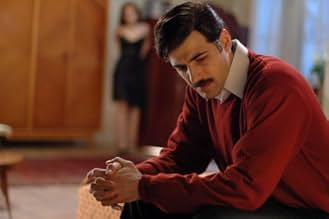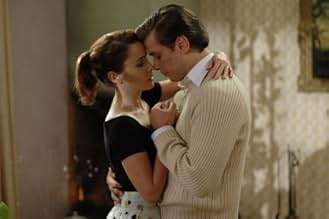Füge eine Handlung in deiner Sprache hinzuLuísa is a romantic, dreamy and delicate young woman married to Jorge, an engineer, a man of good habits and good economic conditions. They didn't know each other well, but got married and L... Alles lesenLuísa is a romantic, dreamy and delicate young woman married to Jorge, an engineer, a man of good habits and good economic conditions. They didn't know each other well, but got married and Luísa was a good wife, "she was clean and happy as a bird". Everything get changed when she... Alles lesenLuísa is a romantic, dreamy and delicate young woman married to Jorge, an engineer, a man of good habits and good economic conditions. They didn't know each other well, but got married and Luísa was a good wife, "she was clean and happy as a bird". Everything get changed when she meets a childhood love, her cousin Basílio. What seemed to be a great adventure will beca... Alles lesen
- Auszeichnungen
- 2 Gewinne & 13 Nominierungen insgesamt
- Policial
- (as Anselmo Vasconcellos)
- Vizinha Luisa
- (as Ana Lucia Torre)
- Ator novela
- (as Jorge Luis Cardoso)
Handlung
WUSSTEST DU SCHON:
- SoundtracksSaudades do Brasil
Written by Antonio Carlos Jobim
Based on the novel by Portuguese writer Eça de Queiroz, "Primo Basílio" was adapted 20 years ago into a miniseries by Rede Globo, which had Tony Ramos, Giulia Gam, Marcos Paulo and Marília Pêra in the main cast. In the direction, the same Daniel Filho. Well, now it seems that these two decades have been bad for him, who seems to have unlearned how to deal with the drama of history. Reynaldo Gianecchini, Debora Falabella, Fábio Assunção and Glória Pires replace the protagonists, obviously with a performance far superior to theirs. But that matters little at the end of the day, since the direction always privileges the messy unfolding of the plot, with no time for any breathing, whether for the character or even the actor behind it.
As already said, some changes are made in relation to the book. The story is transported from Lisbon to São Paulo, and the events take place almost in the 1960s. Until then, no problem. However, the film by director Daniel Filho, responsible for "Se Eu Fosse Você" and "Melhor Gelo e Dois Dedos D'Água", ends up taking away all the depth of the story conceived by Eça de Queiróz, and transforms it into something shallow. Most of his choices are wrong. If the director were different, everything could be different, and the film could work better. What gives breath to Daniel Filho's film is really Glória Pires' character, Juliana, who has a frightening personality. But even so, Juliana, in the book, is much more tyrannical and therefore much more interesting.
Leaving aside the book-film comparisons, which are almost always completer and more interesting than the film adaptations, "Primo Basílio" is a regular specimen. As a cinema, it still has a bit of a television character (telenovela), and appears to be, on some occasions, a genuine Mexican drama. Which is strange to say the least, since director Daniel Filho himself was the one who directed the miniseries in the 1980s. The script for the series showed how to competently transpose to the screen the pages written by Eça de Queiróz. The script for this adaptation, by Euclydes Marinho, has some mistakes. It is difficult to understand, for example, the reason for the help offered without hesitation by Guilherme Fontes' character to Luísa. Too fast is also the plunge into madness of the tormented protagonist and the rejection of her friend Leonor. However, the tape manages to avoid the recurring Manichaeism in productions of the genre. The audience follows the mistreatment suffered by Juliana and Luísa's regret with the same compassion and it's not hard to catch ourselves rooting for a happy ending for both.
Daniel Filho aspires to be a typical example of this "sentimental school". Only, instead of believing in the canons that govern it, the director preferred to enhance on screen what is already exaggerated and exacerbated. It was not enough for Daniel Filho to create a melodrama. He needed to demonstrate to the viewer what he is trying to do and not leave any kind of doubt about his intentions. If there is pain in any scene, the music comes in deafeningly to catalyze that same pain; if there is a flagrant of some crime or suspicious attitude, a close-up makes sure to frame the perpetrator's face (together with the music, of course); if the long-awaited night of love between the lovebirds takes place, it is not enough for them to love each other properly: it is necessary to focus more light on their bodies, put some fruit in close-up and obviously insinuate through the fire that the thing is boiling over there.
This is the director's greatest formula in Primo Basílio: to make melodrama more than it is. At no time is there an attempt to relativize it or even simply refer to it (as Todd Haynes did very well in Far from Heaven, or Nick Cassavetes in the beautiful "The Notebook"). It is more important for the director to put on stage his disbelief in the public's belief - as if it were impossible for the public to believe in the love exposed on the screen. And to force belief, all the grossest artifices are used. It's a mechanism - to stay in the cliché - typical of television. The viewer does not put himself in front of the small screen to have his mind scrambled. The more to the point and the less subtlety the better, because there is neither the time nor the inclination to be deciphering language codes. But from the moment this language arrives at the cinema, from the moment it becomes an easy way out of mediocrity in a universe where the mediocre should be ignored as much as possible, then things change.
Surprisingly, "Primo Basílio" is not entirely devoid of interests. On the contrary: in view of Daniel Filho's previous films, "Primo Basílio" becomes his masterpiece. None of his other works had such sophistication as now - production sophistication, cast treatment, script. But the film's biggest find isn't even the director's responsibility. It is in the story of Eça de Queiroz that originated the film. The film's homonymous novel is one of the strongest narratives in Portuguese literature - in all its irony, cruelty, sadism and criticism of the middle-class bourgeoisie. Even though he modified some elements of the original plot - the biggest one being the change of setting, moving from Lisbon in the 19th century to São Paulo in 1958 -, Euclydes Marinho's script maintains a certain essence of the novel, especially in the inverted relationship between mistress and maid who, at a certain point, takes up all the space in the plot.
Euclydes Marinho's script is faithful to the spirit of the original novel, bringing to light the moral and social issues that permeate the plot. The film addresses themes such as the oppression of women in patriarchal society, appearances versus the true nature of human relationships, and the devastating consequences of deceit and betrayal. These themes are treated with sensitivity and depth, allowing reflection on the social and emotional dynamics that shape the lives of the characters. In terms of performances, "Primo Basílio" comes to prove the talent of the ladies of Brazilian dramaturgy. Glória Pires (discarded of any trace of vanity) manages to make her embittered Juliana the main focus of attention in the plot. What Basilio? The film is hers. The strength of the actress takes a character destined to live in the corners, like the shadow of others, to the foreground. The young Débora Falabella, who had already shown maturity in other roles, asserted herself at the time as one of the most promising names of her generation. Laura Cardoso and Simone Spoladore, despite small participations such as the perverse Vitória and Leonor respectively, also give points to the women's team. In the men's wing, Reynaldo Gianecchini still has a lot to learn. Her career irregularity appears once again in a mechanical performance, out of breath to keep up with her companions on the scene.
The strength of Eça's creation manages to make "Primo Basílio" gain some survival. The feature could become a small milestone of melodrama if it actually believed in its own universe and stopped trying, at all times, to rub in the viewer's eyes more than is really happening on the screen. At best, the film serves as a gateway (or a gateway to memories) of Eça de Queiroz's literature, this is indeed a masterpiece that knew how to extract from melodrama what is most intense and truly romantic and tragic. With very uncreative framing, conventional editing, poor scenery and embarrassing visual effects (what are the scenes of the old city?), "Primo Basílio" still abuses voyeurism (the sex between Assunção and Falabella is so abusive that it even loses meaning within the cinematographic proposal) and the lack of control of the actors: Falabella, the best on the scene, is always on the edge, lacking more precise guidance. What remains is a breathless work, predictable from the first scene and which has an absurd conclusion, unbelievable in the face of our reality. An announced disaster, which is only confirmed with worse disdain with each frame.
"Primo Basílio" addresses several complex themes that permeate the plot and awaken reflections in the viewer. Some of these themes include: Adultery and Consequences, social hypocrisy, desire and unhappiness, Social Masks and mostly delves into the issue of morality and guilt. Characters are confronted with their actions and the moral consequences of their choices. The plot questions the notions of right and wrong, showing how guilt and remorse can corrode conscience and profoundly affect people's lives. In the end, Daniel Filho managed to create a film that goes beyond a simple adaptation, capturing the essence of the original novel and presenting it to a contemporary audience, but it falls short as a cinematographic work, looking like a longer chapter of a telenovela.
- fernandoschiavi
- 28. Juni 2023
- Permalink
Top-Auswahl
Details
Box Office
- Weltweiter Bruttoertrag
- 3.584.330 $
- Laufzeit1 Stunde 46 Minuten
- Farbe
- Seitenverhältnis
- 1.85 : 1
Zu dieser Seite beitragen




























